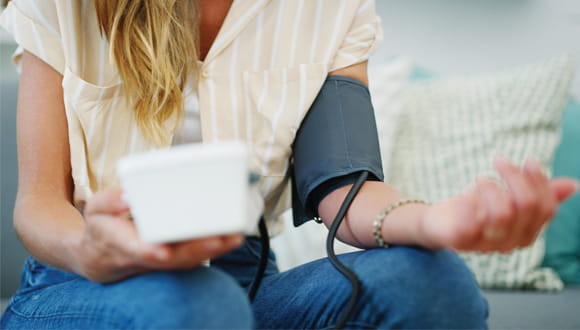5 Things Women Need to Know About High Blood Pressure & Its Symptoms
Dec. 8, 2021 - Katie McCallumYou've likely heard about high blood pressure enough to know that it's a concern you should take seriously.
But what else do you really know about it?
"Having high blood pressure forces your heart to pump harder, and it can also narrow and harden your arteries over time," says Dr. Kershaw Patel, a cardiologist specializing in preventive cardiology at Houston Methodist. "This increases your risk of developing heart disease, stroke and a number of other health conditions."
Another concerning feature of high blood pressure is that it's considered a "silent" disease that can exist with few symptoms, sometimes even none. For this reason, high blood pressure is notoriously underdiagnosed.
"It's important to engage with the health care system and routinely have your blood pressure checked so this condition can be prevented altogether or caught and effectively managed early," Dr. Patel adds.
Here are five things Dr. Patel wants women to know about high blood pressure:
1. High blood pressure symptoms in women can be subtle
High blood pressure, especially in its early stages, can be hard to spot. That's because the most common symptoms are, well, common.
High blood pressure symptoms in women include:
- Headaches
- Fatigue
- Shortness of breath
- Chest discomfort
It's easy to see how these symptoms could be confused with everyday stress, anxiety or, if age appropriate, signs of menopause.
"In some cases, a woman with high blood pressure might not have any discernible symptoms at all," warns Dr. Patel. "The best way to monitor your risk for high blood pressure is to check your blood pressure regularly — whether at your doctor's office or a kiosk in a pharmacy."
2. Don't wait for symptoms — know your blood pressure numbers and what they mean
Once you do get your blood pressure checked, it's important to know what your current numbers mean:
- Normal blood pressure: Lower than 120/80 mmHg
- Elevated blood pressure: Between 120-129/<80 mmHg
- Hypertension, stage 1: Between 130-139/80-<90 mmHg
- Hypertension, stage 2: 140/90 mmHg or higher
"If your blood pressure is elevated, this is when we start to worry about it progressing into high blood pressure," says Dr. Patel. "The higher your blood pressure gets, the harder it becomes to control and the more likely you are to experience complications — so the earlier it's diagnosed and managed, the better."
3. Pregnancy can expose high blood pressure
"A new diagnosis of high blood pressure sometimes occurs during pregnancy," says Dr. Patel. "One reason for this is because the changes that occur during pregnancy can unmask existing high blood pressure that had been lurking in the background."
A new diagnosis may also simply be the result of a woman having her blood pressure measured for the first time in a while at her first prenatal appointment.
"There is also a specific form of high blood pressure that can occur during pregnancy, called preeclampsia," says Dr. Patel. "This is not uncommon and is important to manage for both the mom and baby."
Preeclampsia typically goes away after delivery, but it is very important for a woman who does develop preeclampsia to follow her care team's advice for managing it.
4. A woman's risk of high blood pressure increases after menopause
Menopause, which begins once a woman goes 12 consecutive months without experiencing a period, usually around her 50s, is related to high blood pressure.
"During aging and menopause, there are several changes in the body related to hormone levels and body weight," warns Dr. Patel. "These changes may increase a woman's risk of high blood pressure."
Menopause and its symptoms also might be another reason high blood pressure sometimes goes undiagnosed in women. Symptoms of the two, such as fatigue and headaches, can overlap.
"A woman may delay scheduling a checkup with her doctor about symptoms because they seem related to menopause," Dr. Patel adds. "In this way, high blood pressure can go undiagnosed — which is yet another reason why regularly monitoring your blood pressure is so important."
5. You can take steps to prevent high blood pressure
"The good news is that high blood pressure is avoidable," says Dr. Patel. "The keys to preventing high blood pressure are to focus on making healthy lifestyle choices and avoiding the habits and behaviors known to be unhealthy."
High blood pressure prevention tips include:
- Regularly monitoring your blood pressure
- Maintaining a healthy weight and losing weight if you are overweight
- Eating a well-balanced diet that limits highly processed foods
- Limiting your salt intake
- Getting 150 minutes of physical activity per week
- Limiting alcohol
- Quitting smoking
- Having regular checkups with your primary-care physician
"If you already have high blood pressure, the steps above become even more immediately important for you since they also help manage your blood pressure," recommends Dr. Patel. "Getting high blood pressure under control helps prevent it from progressing, and working with a preventive cardiologist can help you achieve the close monitoring needed to reach your blood pressure goals."








